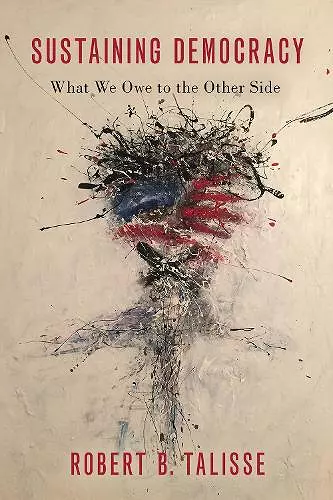Sustaining Democracy
What We Owe to the Other Side
Format:Hardback
Publisher:Oxford University Press Inc
Published:22nd Nov '21
Should be back in stock very soon

Democracy is not easy. Citizens who disagree sharply about politics must nonetheless work together as equal partners in the enterprise of collective self-government. Ideally, this work would be conducted under conditions of mutual civility, with opposed citizens nonetheless recognizing one another's standing as political equals. But when the political stakes are high, and the opposition seems to us severely mistaken, why not drop the democratic pretences of civil partnership, and simply play to win? Why seek to uphold properly democratic relations with those who embrace political ideas that are flawed, irresponsible, and out of step with justice? Why sustain democracy with political foes? Drawing on extensive social science research concerning political polarization and partisan identity, Robert B. Talisse argues that when we break off civil interactions with our political opponents, we imperil relations with our political allies. In the absence of engagement with our political critics, our alliances grow increasingly homogeneous, conformist, and hierarchical. Moreover, they fracture and devolve amidst internal conflicts. In the end, our political aims suffer because our coalitions shrink and grow ineffective. Why sustain democracy with our foes? Because we need them if we are going to sustain democracy with our allies and friends.
I knew I would enjoy reading this book. From the start, Talisse's writing engaged me like a conversation with an observant friend. Yet I did not expect its argument to take hold in my daily life. Talisse's insightful account of political debate prompted me to reflect on my attachment to the Millian exchange of reasons and to put Talissean civility in its place. * Perspectives on Politics *
Talisse's work constitutes an invaluable contribution to the political philosophy of polarization. * Ethical Theory & Moral Practice *
'The democratic road,' John Dewey once wrote, 'is the hard one to take.' Robert Talisse's Sustaining Democracy is about how challenging it is to see our fellow citizens as more than their political affiliation; how difficult it is to see them as potential friends rather than the enemies their party identity might suggest; and how we struggle to honor what democracy demands, namely, that we can stand at a distance from our commitments and subject them to critical scrutiny. There is much in this book to recommend, and there is much with which to disagree. As I struggled with the text, I found myself pulled toward its truths. The question, and it has always been the question, remains: are we up to the demand that democracy places on us? * Melvin Rogers, Associate Professor of Political Science, Brown University *
In this heart-warming and engaging book, Robert Talisse invites us to tackle the democrat's dilemma, to stay true to our beliefs about justice while respecting our opponents as our political equals. When it comes to politics, too often we define ourselves by whom we oppose. Talisse offers us an enticing vision of how we might overcome this, a vision which includes listening closely to each other's objections but also--sometimes--stepping back from the fray of politics. This book is a wonderful response to a critical contemporary problem. * Kimberley Brownlee, Canada Research Chair in Ethics and Political and Social Philosophy, University of British Columbia *
Imagine we wake to find depraved, angry beasts everywhere. Desperate to save our town, we form an armed militia--but we can't stop feuding over who of us is fit to fight. All that saves us is that the brutes are also attacking each other, like we are attacking ourselves. Robert Talisse diagnoses the diseases that distort how we see our political opponents--and that then set us against our allies. Talisse shows that to save our democracy we must remedy the maladies that make us see monsters everywhere. * Leif Wenar, Olive H. Palmer Chair of Humanities, Stanford University *
Talisse's new book is...written in a very accessible style. While it is informed by a broad range of research, including from sociology and political science, its argument is cast in nontechnical language and divided into easily digestible steps. The argument itself is an interesting mix of well-known claims about democracy and original insight. The book's main contribution, a discussion of how to sustain democracy and why it matters, is timely, I think, and helpful. * Ethics *
Sustaining Democracy is the sequel to Robert Talisse's Overdoing Democracy (Oxford: Oxford University Press, 2019)...In Sustaining Democracy, Talisse pursues a dual aim. First, he argues that the risk of overdoing democracy is an inherent feature of democracy, not just a historically unfortunate effect. Second, he offers us a recipe for avoiding this problem: democracy can be sustained if citizens recognize its inherent instability and take action to safeguard themselves from destructive polarization dynamics. * Fabienne Peter, University of Warwick, Ethics *
There is much to admire about Talisse's thoughtful and, at times, endearingly personal reflections on the partisanship of US politics. Talisse has a knack for weaving anecdotes from his own experiences reaching across the proverbial aisle with astute observations about the moral demandingness of democracy as an ideal. Readers unfamiliar with the political science on this topic will also benefit from Talisse's impressive synthesis of empirical research from political psychology and voting behavior, which details the troubling change in mindset that occurs when our party identities morph into social and cultural ones. * Review of Politics *
ISBN: 9780197556450
Dimensions: 137mm x 203mm x 23mm
Weight: 318g
184 pages